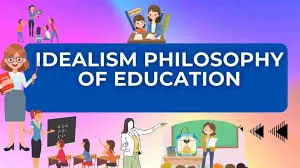Shop this story
Understanding Idealism: Foundations Philosophers & Applicability
What is Idealism?
Idealism is a philosophical doctrine that emphasizes the primacy of the mind and ideas in interpreting the world.
It posits that reality is fundamentally mental or immaterial and that our perceptions and concepts shape our experience of the world. Idealism asserts that the material world is secondary to the ideas that we form about it, and it tends to prioritize concepts such as consciousness, perception, and abstract ideas over physical reality.
Key Characteristics of Idealism
– Primacy of the Mind: Reality is primarily shaped by mental constructs rather than material aspects.
– Focus on Ideas: Ideas and values are seen as the true essence of reality, influencing our understanding and perception of the world.
– Subjectivity: Emphasizes individual experiences and perceptions in the formation of knowledge and reality.
Assumptions of Idealism
Idealism operates under several key assumptions:
1. Reality as Mental: The belief that an individual’s mind is the basis of reality. What we know and experience is constructed through mental processes.
2. Interconnectedness of Ideas: Ideas do not exist in isolation but are interconnected, forming a broader understanding of knowledge and reality.
3. Objective Knowledge is Possible: While subjective, idealism suggests that through reason and reflection, individuals can arrive at a more objective understanding of truths.
4. Values and Ethics: Idealism often emphasizes the importance of moral values and ethical considerations as fundamental to understanding human interactions and society.
Philosophers Associated with Idealism
Several philosophers have contributed to the development and evolution of idealistic thought. Notable figures include:
1. Plato (c. 428/427–348/347 BC) – Plato is often considered one of the earliest idealists, with his theory of Forms asserting that non-material abstract forms (ideas) represent the most accurate reality.
This is exemplified in his Allegory of the Cave, where he suggests that the physical world is merely a shadow of the true reality.
2. Immanuel Kant (1724–1804)
– Kant proposed a critical idealism that distinguished between things as they appear to us (phenomena) and things as they are in themselves (noumena). He believed that our experiences are shaped by the mind’s structures, which interpret sensory data.
3. Georg Wilhelm Friedrich Hegel (1770–1831)
– Hegel advanced absolute idealism, arguing that reality is an evolving process of the spirit (Geist) realizing itself. For Hegel, history, culture, and thought are interconnected developments leading to the unfolding of the absolute idea.
4. Bishop Berkeley (1685–1753) – Berkeley famously asserted that existence is fundamentally tied to perception, captured in his principle: “Esse est percipi” (to be is to be perceived). He believed that objects do not exist outside of their perception.
5. John Dewey (1859–1952) – A leading figure in pragmatic idealism, Dewey emphasized the role of ideas in shaping actions and experiences. He argued for the application of idealism in education and social reform as a means to improve society.
Applicability of Idealism to Knowledge Advancement in Social Studies
Idealism has profound implications for knowledge advancement in social studies, influencing various aspects such as education, ethics, and cultural understanding.
– Constructivist Approach: Idealism supports the constructivist approach in education, wherein students are encouraged to engage actively with ideas and knowledge, promoting critical thinking and self-reflection.
– Development of Values: Emphasis on moral education and the development of ethical reasoning aligns with an idealistic framework, as it focuses on nurturing just and virtuous citizens.
2. Cultural and Social Understanding
– Interconnectedness of Ideas: Idealism promotes understanding the interconnectedness of cultural norms, values, and beliefs, which is vital for a comprehensive grasp of social studies.
– Critical Examination of Concepts: Idealism fosters critical examination of social constructs, encouraging scholars to analyze ethical, philosophical, and psychological underpinnings that shape societal dynamics.
3. Policy and Governance
– Ethical Frameworks: Idealism can influence policymaking and governance by emphasizing ethical considerations and the importance of civic virtue in shaping laws and societal structures.
– Vision for Progress: Idealism encourages a forward-looking perspective, envisioning an improved society through education and engagement with fundamental ideas that inspire change.
4. Community Engagement – Active Participation: Idealism can inspire grassroots movements by promoting the idea that individuals can effect change through collective action and adherence to shared ethical principles.
Conclusion
Idealism presents a rich philosophical foundation that emphasizes the significance of ideas, morality, and human consciousness.
It plays a pivotal role in shaping our understanding of reality, influencing educational practices, and guiding societal progress. In the context of social studies, idealism encourages a deeper exploration of cultural dynamics, ethical values, and the interconnectedness of our shared experiences.
By engaging with idealist principles, we can foster a more thoughtful and just society, nurturing progress through informed and conscientious participation in our communities.
For those seeking to delve deeper into idealism and its applications in social studies, here are some valuable resources:
– Stanford Encyclopedia of Philosophy – Idealism
– Internet Encyclopedia of Philosophy – Idealism
– The Philosophy Project – Idealism
Whether through philosophical inquiry or practical application, understanding idealism can enhance our approach to learning, engagement, and improvement in all areas of life.
What is Positivism and it’s Assumptions
Further reading
- Afghan afghani (؋)
- Albanian lek (L)
- Algerian dinar (د.ج)
- Angolan kwanza (Kz)
- Argentine peso (ARS $)
- Armenian dram (AMD)
- Aruban florin (Afl.)
- Australian dollar ($)
- Azerbaijani manat (AZN)
- Bahamian dollar ($)
- Bahraini dinar (.د.ب)
- Bangladeshi taka (৳ )
- Belarusian ruble (Br)
- Belize dollar ($)
- Bermudian dollar ($)
- Bhutanese ngultrum (Nu.)
- Bolivian boliviano (Bs.)
- Bosnia and Herzegovina convertible mark (KM)
- Botswana pula (P)
- Brazilian real (R$)
- Brunei dollar ($)
- Bulgarian lev (лв.)
- Burmese kyat (Ks)
- Burundian franc (Fr)
- CFP franc (Fr)
- Cambodian riel (៛)
- Canadian dollar ($)
- Cape Verdean escudo ($)
- Cayman Islands dollar ($)
- Central African CFA franc (CFA)
- Chilean peso (CLP $)
- Chinese yuan (¥)
- Colombian peso (COP $)
- Comorian franc (Fr)
- Congolese franc (Fr)
- Costa Rican colón (₡)
- Croatian kuna (Kn)
- Cuban convertible peso (CUC$)
- Cuban peso (CUP ₱)
- Czech koruna (Kč)
- Danish krone (DKK)
- Djiboutian franc (Fr)
- Dominican peso (RD$)
- East Caribbean dollar ($)
- Egyptian pound (EGP)
- Eritrean nakfa (Nfk)
- Ethiopian birr (Br)
- Euro (€)
- Falkland Islands pound (£)
- Fijian dollar ($)
- Gambian dalasi (D)
- Georgian lari (ლ)
- Ghana cedi (₵)
- Gibraltar pound (£)
- Guatemalan quetzal (Q)
- Guernsey pound (£)
- Guinean franc (Fr)
- Guyanese dollar ($)
- Haitian gourde (G)
- Honduran lempira (L)
- Hong Kong dollar ($)
- Hungarian forint (Ft)
- Icelandic króna (kr.)
- Indian rupee (₹)
- Indonesian rupiah (Rp)
- Iranian rial (﷼)
- Iraqi dinar (ع.د)
- Israeli new shekel (₪)
- Jamaican dollar ($)
- Japanese yen (¥)
- Jersey pound (£)
- Jordanian dinar (د.ا)
- Kazakhstani tenge (KZT)
- Kenyan shilling (KSh)
- Kuwaiti dinar (د.ك)
- Kyrgyzstani som (сом)
- Lao kip (₭)
- Lebanese pound (ل.ل)
- Lesotho loti (L)
- Liberian dollar ($)
- Libyan dinar (ل.د)
- Macanese pataca (P)
- Macedonian denar (ден)
- Malagasy ariary (Ar)
- Malawian kwacha (MK)
- Malaysian ringgit (RM)
- Maldivian rufiyaa (.ރ)
- Manx pound (£)
- Mauritian rupee (₨)
- Mexican peso (MXN $)
- Moldovan leu (MDL)
- Mongolian tögrög (₮)
- Moroccan dirham (د.م.)
- Mozambican metical (MT)
- Namibian dollar ($)
- Nepalese rupee (₨)
- Netherlands Antillean guilder (ƒ)
- New Taiwan dollar (NT$)
- New Zealand dollar ($)
- Nicaraguan córdoba (C$)
- Nigerian naira (₦)
- North Korean won (₩)
- Norwegian krone (kr)
- Omani rial (ر.ع.)
- Pakistani rupee (₨)
- Panamanian balboa (B/.)
- Papua New Guinean kina (K)
- Paraguayan guaraní (₲)
- Philippine peso (PHP ₱)
- Polish złoty (zł)
- Pound sterling (£)
- Qatari riyal (ر.ق)
- Romanian leu (lei)
- Russian ruble (₽)
- Rwandan franc (Fr)
- Saint Helena pound (£)
- Samoan tālā (T)
- Saudi riyal (ر.س)
- Serbian dinar (дин.)
- Seychellois rupee (₨)
- Sierra Leonean leone (Le)
- Singapore dollar ($)
- Peruvian nuevo sol (S/.)
- Solomon Islands dollar ($)
- Somali shilling (Sh)
- South African rand (R)
- South Korean won (₩)
- South Sudanese pound (£)
- Sri Lankan rupee (රු)
- Sudanese pound (ج.س.)
- Surinamese dollar ($)
- Swazi lilangeni (L)
- Swedish krona (kr)
- Swiss franc (CHF)
- Syrian pound (ل.س)
- Tajikistani somoni (ЅМ)
- Tanzanian shilling (Sh)
- Thai baht (฿)
- Tongan paʻanga (T$)
- Trinidad and Tobago dollar ($)
- Tunisian dinar (د.ت)
- Turkish lira (₺)
- Turkmenistan manat (m)
- Ugandan shilling (UGX)
- Ukrainian hryvnia (₴)
- United Arab Emirates dirham (AED)
- United States dollar ($)
- Uruguayan peso ($U)
- Uzbekistani som (UZS)
- Vanuatu vatu (Vt)
- Vietnamese đồng (₫)
- West African CFA franc (CFA)
- Yemeni rial (﷼)
- Zambian kwacha (ZK)
- Smart Shop (426)
- Smart Health (21)
- Privacy Policy
- HT Mall
- About Us
- Start Here
- HT Blog
- Shop Here (426)
- Human Hair (21)
- Smart Phones (63)
- Network Devices (18)
- Smart Watches (17)
- Smart Games (6)
- Smart Nail Care (7)
- Kitchenware (11)
- Phone Accessories (15)
- Smart Razors (2)
- Car Accessories (15)
- Smart Kid (10)
- Smart Devices (49)
- Smart Phones (63)
- Smart Massagers (29)
- Phone Accessories (15)
- Slim Fit (18)
- Smart Lights (7)
- Anti Aging (5)
- Books (3)
- Smart Hair Care (3)
- Smart Routers (1)
- Smart Security (8)
- Earn with Us
- Wishlist











Leave a comment